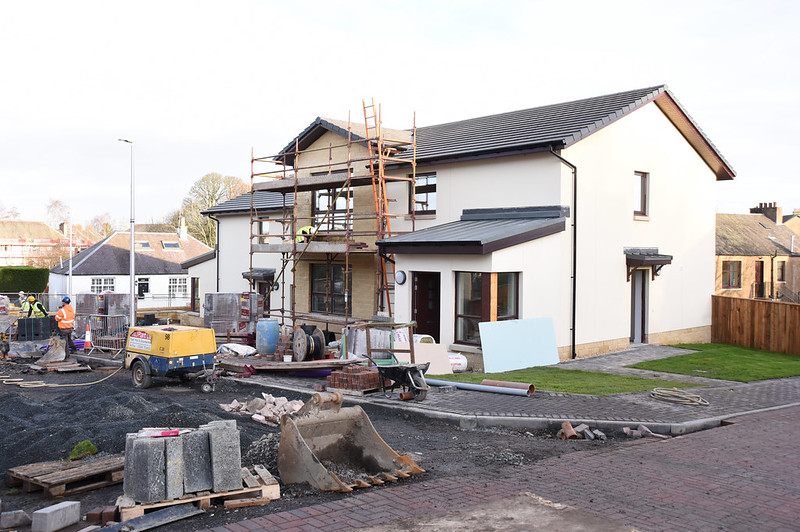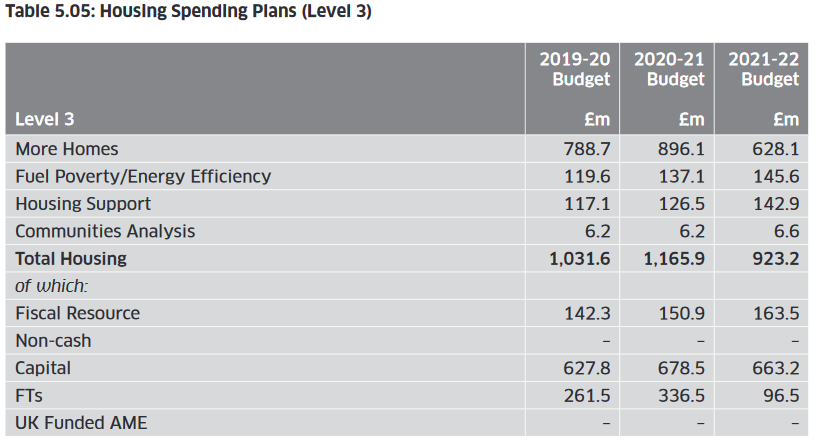Scottish Budget: Funding outlined for homes and regeneration but affordable housing cut condemned
Funding announced by the Scottish Government falls short of delivering the required number of affordable homes needed in Scotland and won’t effectively tackle fuel poverty, housing charities have warned following yesterday’s Scottish Budget.

Placing more affordable, greener housing “at the heart” of the announcement, finance minister Kate Forbes’ Budget included £711.6 million to deliver affordable homes, £81.6m for regeneration programmes, including £5m to regenerate Scotland’s vacant and derelict land, and £150m for fuel poverty and energy efficiency measures.
However, Shelter Scotland highlighted that the government’s £628.1m More Homes allocation, represents a cut of £268m when compared to the 2020/21 Budget.
Alison Watson, the charity’s director, said: “It’s shocking to see the Scottish Government cutting investment in affordable housebuilding to the tune of £200m.
“The Cabinet Secretary recognised herself that Covid has ‘underlined the value of a safe, secure and affordable home.’ But today she has chosen to cut investment in social and affordable homes, at the same time as choosing to find an extra £100m for motorways, roads and air travel.
“Good quality housing is literally a matter of life and death. That’s why we’ve repeatedly called on the Scottish Government to commit to reducing affordable housing need by the end of the next parliament. Today, they’ve not only failed to take the opportunity to do so – they’ve actually gone backwards.
“We hope to see more ambition on affordable housebuilding in next week’s Infrastructure Investment Plan, and in the final Housing to 2040 document.”
Ms Watson added: “With many families struggling to make ends meet, we welcome the Scottish Government’s decision to top up the money available for Discretionary Housing Payments. We call on them to continue to top it up as the impact of the pandemic will last for many more months.”
CIH Scotland said while it noted that the money announced for the next affordable housing supply programme provides the basis to build the 53,000 affordable homes Scotland needs between 2021 to 2026, this will require additional investment across the next Parliament.
Callum Chomczuk, national director of CIH Scotland, said: “The funding announced yesterday for the Affordable Housing Supply Programme is a start. But with the costs of construction rising and social landlords expected to meet new higher building standards, this needs to be seen as the down payment on a more ambitious funding programme for social and affordable homes over the next five years.
“This means that, when the upcoming Housing to 2040 strategy is published in March, there is a clear commitment to building 53,000 affordable homes, including 37,100 homes for social rent.
“By setting out an ambitious programme of affordable house building, and matching it with an uprating of grant rates in the promised review, we can put social justice at the heart of our response to the pandemic and ensure everyone has access to a safe, warm, affordable home.”
Following the Budget, the Existing Homes Alliance Scotland (EHA) is asking the Scottish Government to recognise the wider benefits of investing in energy efficiency by calling for a scaling up of existing fuel poverty and energy efficiency programmes.
The EHA welcomed the commitment to invest £1.6 billion in improving energy efficiency in buildings but cautioned that this funding needs to be frontloaded and increase over time.
While the Budget includes a small increase in funding for fuel poverty and energy efficiency programmes, EHA said it fall significantly short of the £244m it believes is needed.
Lori McElroy, chair of the Existing Homes Alliance, said: “It is right that this budget focuses on delivering a green recovery and investing in energy efficiency must be at the heart of that.
“But this budget falls well short of what is needed. The Scottish Government’s own research says the number in fuel poverty could increase to nearly 30% of Scotland’s population as a result of the pandemic.
“This is a missed opportunity – not only to transform peoples’ homes and tackle fuel poverty, but also to create up to 17,000 jobs and cut the cost of heat decarbonisation.
“We know that meeting our statutory 75% emissions reduction target by 2030 is going to be challenging. The Scottish Government’s updated Climate Change Plan gave a very welcome commitment that 1 million homes would be zero carbon emissions from heat by 2030 – that’s 100,000 homes each year. The current installation rate is fewer than 3,000 per year.
“We need to build on our existing strong delivery mechanisms, scaling up and accelerating programmes such as Warmer Homes Scotland and Area-Based Schemes, if we are to reach 100,000 homes per year and have any chance of meeting our climate change and fuel poverty targets.”

Source: Scottish Government (Scottish Budget: 2021-22)
The Existing Homes Alliance is calling for the Scottish Government and opposition parties to work together to deliver a budget that:
- Doubles the funding for Warmer Homes Scotland and Area Based Schemes;
- Funds a large-scale national engagement campaign to build public support and awareness and expand advice and support services to deal with increased demand;
- Creates a Rural Homes Transition Package to help homeowners and landlords invest in remote and rural areas; and
- Invests in innovation as part of a green recovery, including a zero-carbon retrofit exemplar programme, installation of 500 hybrid heat pumps in on-gas areas and support for local authorities to develop not for profit affordable energy companies.
Lori McElroy added: “This draft Budget does not sit comfortably alongside the ambitious targets set out in the Climate Change Plan. We run the risk of missing a great opportunity to create jobs and transform our cold and draughty homes. It is absolutely critical that the Scottish Budget includes the funding needed to make rapid progress toward meeting climate change and fuel poverty targets.”
The Federation of Master Builders (FMB) said the Scottish Government’s Strategic Framework Business Fund must be made available to building and construction firms if Scotland is to build back greener from the pandemic.
Gordon Nelson, Scotland director at the FMB, said: “Since the imposition of coronavirus restrictions earlier this month that curb non-essential construction work or services within homes, Scottish builders have experienced drastically reduced workloads yet remain ineligible for the Strategic Framework Business Fund. This is an anomaly that threatens the survival of many small and medium sized Scottish builders, in particular those operating in the repair, maintenance and improvement sector. As we look toward COP26 in Glasgow later this year and the ambition of achieving Net-Zero by 2045, these firms will be of paramount importance in our efforts to reduce carbon emissions through retrofitting our existing housing stock.”
Mr Nelson added: “The Scottish Government should also bring forward their draft Heat in Buildings Strategy. This will increase confidence within local building firms through encouraging greater demand for and investment in retrofit, and establishing a clear pipeline of work that will enable these businesses to thrive and allow Scotland to deliver on its climate change ambitions.”
The Scottish Government said the affordable housing funding will contribute to its net-zero ambitions while helping to ensure everyone has a home that meets their needs.
Housing, planning and local government minister Kevin Stewart said: “The 2021-22 Scottish Budget affirms yet again our commitment to funding good-quality, affordable homes for the people of Scotland. Ensuring everyone has access to a safe, warm and affordable place to call home is at the heart of our ambition for a fairer Scotland, and this Budget builds on the excellent progress made since 2007 with almost 97,000 affordable homes delivered, almost 67,000 of these being for social rent.
“We are delivering this Budget against a shortfall of over £500m in consequentials for housing as a result of decisions taken in the UK Government’s Spending Review last autumn. While we have protected the housing budget from this as much as we can, it has of course had an impact on our overall budget for affordable housing, and we are calling on the UK Government to urgently clarify their forthcoming plans to restore this funding to the levels required to deliver housing commitments in all parts of the UK.
“The coronavirus pandemic has reinforced the need to think differently about housing and its place within our communities. Later this year we will publish our Housing to 2040 strategy, setting out a 20-year plan to deliver good quality, energy efficient, net zero carbon housing with access to outdoor space, transport links, digital connectivity and community services.
“This Budget lays the groundwork for this with £81.6m for regeneration programmes, including to support community regeneration, town centres and 20-minute neighbourhoods – where people can meet their needs within a 20-minute walk from their house - alongside £5m for a new scheme aiming to regenerate vacant and derelict land. This scheme, which will repurpose the land for anything from community gardens or urban woodland to low-carbon affordable housing, is part of our Low Carbon Fund and will be worth £50m over five years.
“Of course, the environment must be at the centre of our thinking, and we’ve also allocated £150m to improve energy efficiency in people’s homes and tackle fuel poverty.”








